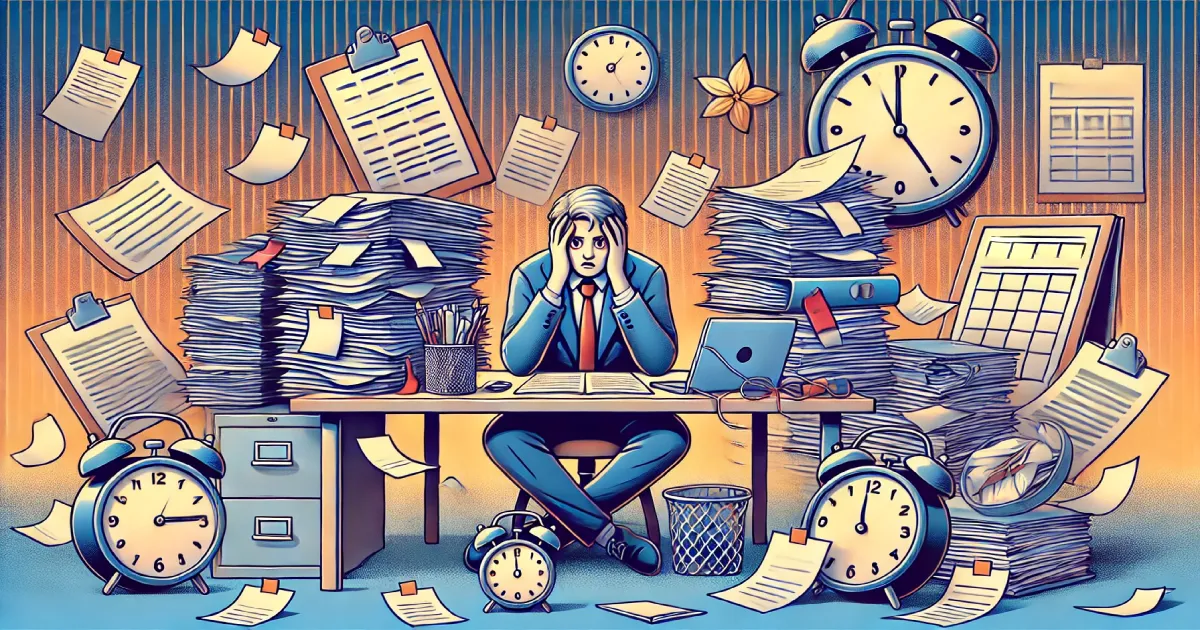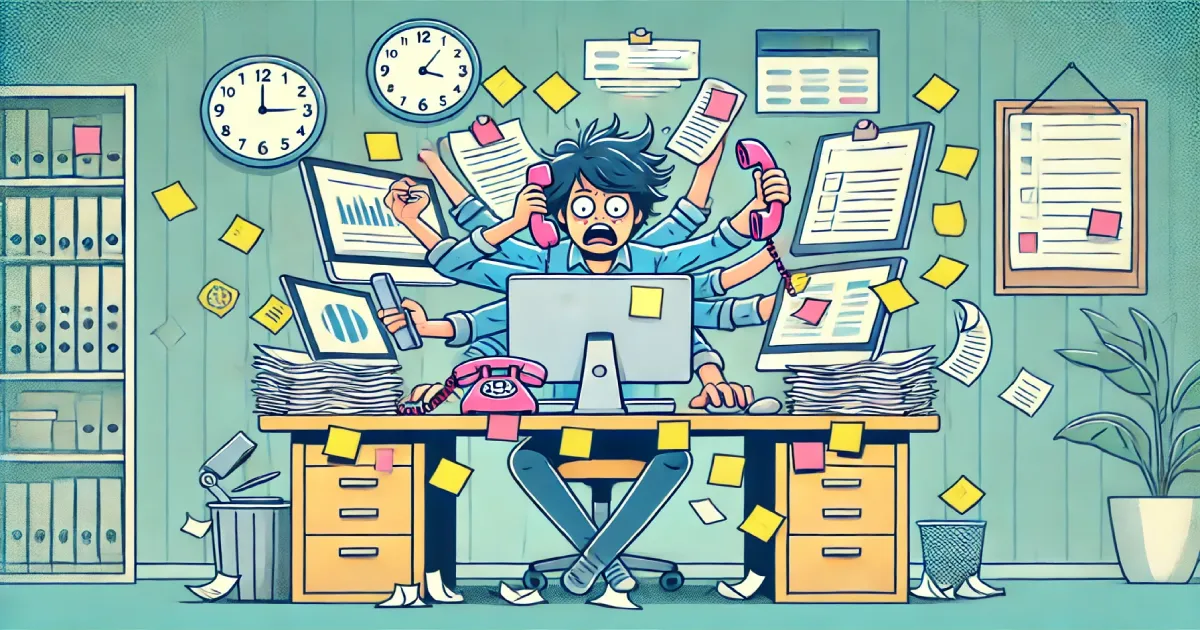4 Surprising Productivity Killers

Productivity is often seen as the ultimate key to success, both professionally and personally. We constantly seek ways to enhance our efficiency, juggle multiple tasks, and achieve more in less time. While there are well-known productivity pitfalls like excessive social media use or poor time management, some productivity killers are less obvious yet equally detrimental.
Understanding these surprising productivity killers can help us navigate our work and personal lives more effectively, leading to greater satisfaction and achievement. Let's look into 4 unexpected factors that can significantly hinder productivity: perfectionism, multitasking, lack of sleep, and poor communication. By recognizing and addressing these issues, we can adopt strategies to enhance our productivity and achieve our goals more efficiently.
Productivity Killer 1) Perfectionism

Perfectionism, often perceived as a desire for excellence, can be a double-edged sword. While striving for high standards is commendable, perfectionism can lead to procrastination, anxiety, and an inability to complete tasks. Perfectionists may spend excessive time refining their work, delaying project completion and hindering overall productivity.
Characteristics of Perfectionism
Perfectionists set exceptionally high standards for themselves and others. They tend to be overly critical of their work, fearing failure and mistakes. This mindset can result in an endless cycle of revisions, where nothing ever seems "good enough." For instance, a graphic designer might spend countless hours tweaking minor details on a project, missing deadlines and delaying the entire team's progress. Similarly, a writer might endlessly revise their work, preventing them from moving on to new assignments.
The Impact on Productivity
The quest for perfection often leads to significant delays. A study by the American Psychological Association found that perfectionism is closely linked to procrastination. Individuals who are overly concerned with making their work flawless often put off starting or completing tasks, leading to missed deadlines and reduced productivity. Moreover, perfectionism can cause stress and burnout, further diminishing one’s ability to work efficiently.
Strategies to Overcome Perfectionism
- Setting Realistic Goals: Break tasks into smaller, manageable steps with achievable milestones. This approach helps perfectionists see progress and reduces the pressure to make every step perfect.
- Embracing "Good Enough": Understand that perfection is unattainable, and sometimes, a well-done job is better than an endless quest for flawlessness. Adopting the mindset of "good enough" can lead to more timely and efficient work completion.
- Practicing Self-Compassion: Be kind to yourself and acknowledge that mistakes are part of the learning process. Self-compassion can alleviate the fear of failure and encourage a healthier approach to work.
Productivity Killer 2) Multitasking

The myth of multitasking is pervasive in modern work culture, with many believing it to be an effective way to handle multiple responsibilities simultaneously. However, research consistently shows that multitasking reduces efficiency and cognitive performance. Switching between tasks causes mental blocks, making it harder to focus and complete tasks promptly.
The Myth of Multitasking
Multitasking gives the illusion of productivity because it feels like more is being accomplished. However, our brains are not wired to handle multiple tasks simultaneously. Instead, we switch rapidly between tasks, which increases cognitive load and reduces overall efficiency. Studies from the American Psychological Association indicate that task-switching can lead to a 40% decrease in productivity.
Examples of Disrupted Workflow
For instance, an employee answering emails while participating in a conference call may miss critical information, resulting in mistakes and miscommunication. Similarly, a student studying for exams while browsing social media might find it challenging to retain information. These examples illustrate how multitasking can fragment attention and disrupt workflow, leading to lower quality work and longer completion times.
Tips to Combat Multitasking
- Prioritizing Tasks: Use tools like the Eisenhower Matrix to categorize tasks based on urgency and importance. Focusing on high-priority tasks first can streamline work processes.
- Time-Blocking: Allocate specific time slots for different activities, ensuring focused attention on one task at a time. This method promotes deep work and reduces the tendency to multitask.
- Practicing Mindfulness: Engage fully in the task at hand, reducing distractions and improving efficiency. Mindfulness practices, such as meditation, can enhance concentration and task performance.
Productivity Killer 3) Lack of Sleep

Adequate sleep is crucial for cognitive function, memory consolidation, and overall well-being. Sleep deprivation impairs attention, decision-making, and reaction times, significantly affecting productivity. Despite the known benefits of sleep, many people sacrifice rest to meet deadlines, leading to diminishing returns on their efforts.
The Relationship Between Sleep and Productivity
The National Sleep Foundation reports that adults need 7-9 hours of sleep per night for optimal health and functioning. However, a significant portion of the workforce operates on less sleep, believing they can "power through" fatigue. This misconception leads to decreased cognitive abilities, slower reaction times, and poor decision-making, all of which impair productivity.
Effects of Sleep Deprivation
Research indicates that individuals who consistently get insufficient sleep perform poorly on cognitive tasks and exhibit reduced workplace productivity. For example, a manager who works late into the night might struggle with decision-making and problem-solving the next day. Chronic sleep deprivation can also lead to more serious health issues, further impacting one’s ability to work effectively.
Solutions to Improve Sleep Habits
- Consistent Sleep Schedule: Go to bed and wake up at the same time every day, even on weekends. This routine helps regulate the body’s internal clock, promoting better sleep quality.
- Sleep-Friendly Environment: Ensure a dark, quiet, and cool room to promote restful sleep. Investing in a comfortable mattress and eliminating noise disturbances can significantly improve sleep quality.
- Reducing Screen Time: Avoid screens at least an hour before bed to minimize blue light exposure, which can interfere with the body’s natural sleep-wake cycle. Engaging in relaxing activities, such as reading or meditation, can help prepare the mind and body for sleep.
Productivity Killer 4) Poor Communication

Effective communication is vital for teamwork, project success, and overall productivity. Poor communication can lead to misunderstandings, errors, and wasted time, derailing projects and creating friction within teams. Miscommunication can occur in various forms, such as unclear instructions, lack of feedback, or ineffective use of communication tools.
Impact on Teamwork and Projects
Poor communication can significantly hinder team productivity. For instance, a project might be delayed because team members did not clearly understand their roles and responsibilities, leading to duplicated efforts or missed tasks. Similarly, a lack of timely feedback can result in prolonged work cycles and unmet expectations.
Common Communication Pitfalls
- Unclear Instructions: Vague or incomplete instructions can cause confusion and errors, requiring additional time and effort to correct.
- Lack of Feedback: Without regular feedback, employees may continue down the wrong path, wasting valuable time and resources.
- Ineffective Tools: Relying on inefficient communication tools can lead to lost messages, missed deadlines, and overall project delays.
Enhancing Communication Skills
- Encouraging Open Dialogue: Create an environment where team members feel comfortable sharing ideas and concerns. Open dialogue promotes transparency and collaboration, leading to more efficient problem-solving and innovation.
- Utilizing Collaborative Tools: Leverage tools like Slack, Trello, or Asana to streamline communication and project management. These platforms facilitate real-time communication, task tracking, and file sharing, enhancing team coordination and productivity.
- Constructive Feedback: Regularly provide and solicit feedback to ensure alignment and continuous improvement. Constructive feedback helps clarify expectations, correct course, and motivate team members to achieve their best work.
Final Thoughts
In conclusion, productivity is influenced by various factors, some of which might be surprising. Perfectionism, multitasking, lack of sleep, and poor communication are often overlooked but can significantly hinder our efficiency and output. By recognizing these productivity killers and implementing strategies to address them, we can create a more productive and balanced work environment.
Embracing realistic goals, single-tasking, prioritizing sleep, and enhancing communication are essential steps towards achieving greater productivity and overall well-being.
Key Takeaways
| Productivity Killer | Impact on Productivity | How to Overcome |
|---|---|---|
| 1. Perfectionism | Causes delays and stress | Set realistic goals, accept "good enough," be kind to yourself |
| 2. Multitasking | Lowers focus and quality | Prioritize tasks, time-block, focus on one task at a time |
| 3. Lack of Sleep | Hurts cognitive function and decision-making | Keep a regular sleep schedule, create a good sleep environment, avoid screens before bed |
| 4. Poor Communication | Leads to misunderstandings and wasted time | Encourage open dialogue, use effective tools, give and seek feedback |





